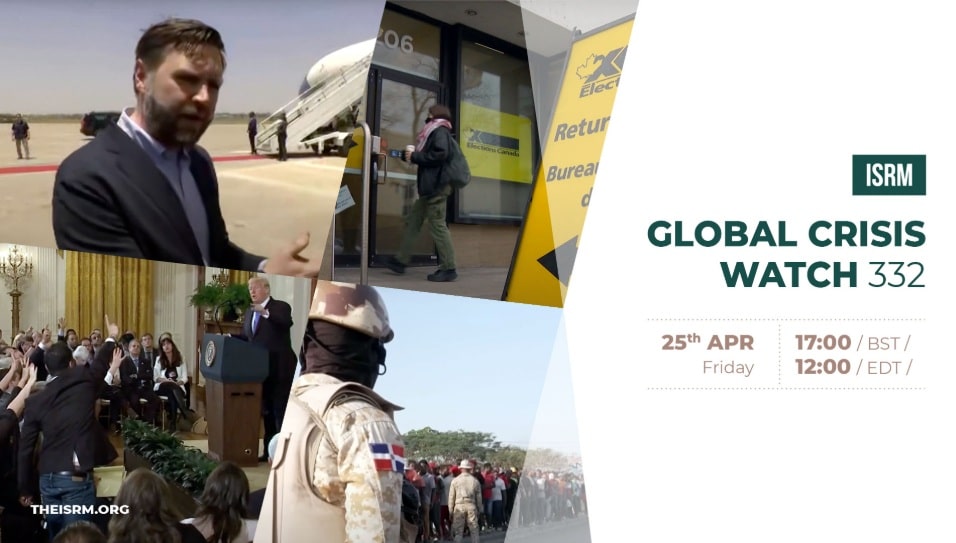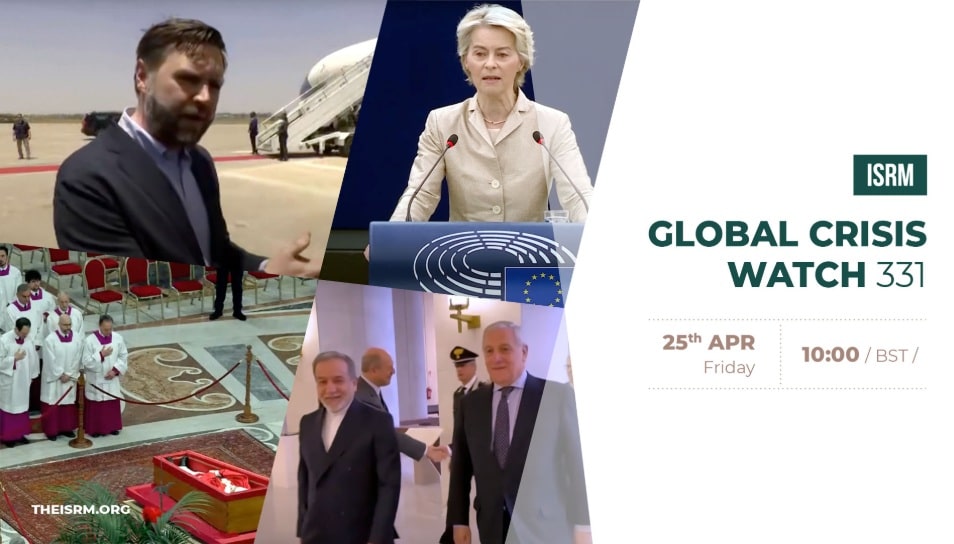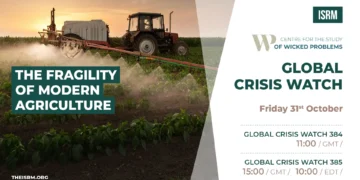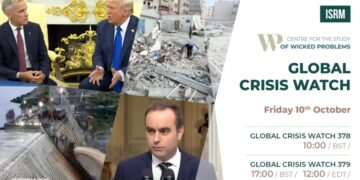The Institute of Strategic Risk Management (ISRM) has launched its latest Global Crisis Watch webinars, 331 and 332, which will take place at 10am BST, and 12pm BST and 5pm EST, respectively. For GCW 331, the topics will include the threatened Ukraine peace deal in doubt, which as US signals deadline, Ukraine is standing firm on sovereignty, the death of Pope Francis, and what it might mean for the influence of Catholicism globally, cautious optimism as US and Iran resume nuclear talks, and the EU hitting Apple and Meta with €700M in first big tech crackdown under new law. Read more about the topics below.
Peace deal in doubt: US signals deadline, Ukraine stands firm on sovereignty
US Vice-President JD Vance warned that the United States may “walk away” from peace efforts unless Ukraine and Russia agree to a new proposal aimed at stopping the war. His comments follow downgraded talks in London involving the UK, France, Germany, Ukraine and the US, after key American officials unexpectedly withdrew. Focus now shifts to upcoming Moscow talks, where US envoy Steve Witkoff will meet Russian President Vladimir Putin for the fourth time.
Vance emphasized that the US has made a “very explicit proposal” and it is now time for the parties to decide. The proposal appears to suggest freezing the war along current front lines, with both sides giving up some territorial claims. Ukrainian President Volodymyr Zelenskyy reiterated his demand for a full, unconditional ceasefire and flatly rejected any recognition of Crimea as Russian territory.
Reports have circulated that Moscow may be willing to stop its offensive if allowed to keep Crimea, though Kremlin spokesperson Dmitry Peskov dismissed these as false. Ukraine continues to reject any concessions on what it calls “non- negotiable” issues, including territorial integrity. Zelenskyy also proposed a 30-day halt to missile and drone strikes on civilian infrastructure, pointing to the brief Easter truce as proof that Russia could stop attacks if it wanted to.
Despite talk of peace, Russia escalated its strikes this week, killing civilians in several cities including Marhanets, Zaporizhzhia and Kharkiv. British officials confirmed there was no sustained lull in attacks, despite Putin’s claims of a holiday ceasefire.
The US and allies appear increasingly eager for a resolution, but fundamental disagreements over territory and trust continue to stall diplomacy. With hundreds of thousands killed or wounded and millions displaced, the war shows little sign of ending without major compromises—something neither Kyiv nor Moscow currently
appears willing to make.
The death of Pope Francis: Is Christianity still a significant global influence?
The death of Pope Francis on 21st April, 2025, raises important questions about the ongoing influence of Christianity in a world increasingly marked by secularism and shifting geopolitical dynamics. Pope Francis’s papacy was defined by a distinctive approach to leadership—one that combined spiritual guidance with active engagement in global issues. Throughout his tenure, he consistently used his position to advocate for peace, social justice and the protection of marginalized communities. His visits to conflict zones such as South Sudan and his close interest in the events unfolding in Gaza, where he urged leaders to lay down their weapons, made clear his commitment to reconciliation and humanitarianism.
Pope Francis also placed great emphasis on issues like climate change, migration and poverty, using his platform to call for change in a way that resonated with both religious and secular audiences. His progressive views, particularly on topics like LGBTQ+ rights and the preservation of the natural environment, often clashed with more traditional factions within the Church, but they also expanded the Church’s reach to a broader, more diverse audience.
In contrast to the more institutionalized nature of the Vatican, Pope Francis led with humility and simplicity. He chose to live in a guesthouse instead of the papal apartments and worked tirelessly to maintain a direct connection with people around the world. Despite the rise of secularism and challenges to the Church’s authority, his leadership showed that religious influence—when rooted in compassion and authenticity—can still shape global discourse.
With his passing, the question remains: Can Christianity maintain its relevance in global affairs without figures like Pope Francis, who bridged the gap between faith, morality and global change? While secular forces grow stronger, the legacy of Pope Francis highlights that the spiritual values of Christianity can still inspire global action, especially in a world seeking compassion and ethical guidance.
Cautious optimism as US and Iran resume nuclear talks
The United States and Iran have resumed indirect nuclear negotiations, with two recent rounds of Oman-mediated discussions held in Muscat and Rome. These talks mark a cautious yet notable thaw in relations after years of stalemate following the US withdrawal from the 2015 Joint Comprehensive Plan of Action (JCPOA). Technical-level discussions begin this week in Oman to clarify the details of sanctions relief in exchange for limits on Iran’s nuclear program.
The JCPOA, negotiated under President Obama, limited Iran’s uranium enrichment to 3.67% in exchange for sanctions relief. President Trump abandoned the deal in 2018, citing Israeli concerns and labeling it a “bad deal,” and reinstated harsh sanctions. In response, Iran increased enrichment levels to 60%, though still below the 90% needed for a nuclear weapon. Iran maintains that it does not seek nuclear weapons, with Supreme Leader Ayatollah Khamenei having issued a religious decree forbidding their development.
Recent signs of progress include both sides sharing a room during the second round of talks and positive comments from Iran’s Foreign Minister Abbas Araghchi. However, Iran demands US guarantees on deal adherence, while the US wants Iran to roll back enrichment.
China remains a critical player, supporting Iran’s peaceful nuclear ambitions while opposing unilateral US sanctions. China, Iran’s main oil buyer, has built a sanction-resistant trade network and continues to import large volumes of Iranian crude. Recent US sanctions on Chinese refiners reflect ongoing tensions.
Whether a new agreement can be reached remains uncertain. Both sides appear open to compromise, but any deal will require navigating deep-rooted mistrust, regional politics and global interests.
EU hits Apple and Meta with €700M in first big tech crackdown under new law
The European Union has fined Apple and Meta a combined €700 million in the first enforcement of its Digital Markets Act (DMA), aimed at curbing the dominance of major tech firms. Apple received a €500 million penalty for restricting app developers from informing users about alternative purchasing options outside its App Store. This violates the DMA’s “steering” provision, which promotes consumer choice and competitive pricing. Meta was fined €200 million for implementing a “consent or pay” model on Facebook and Instagram, where users either had to allow personal data tracking or pay for ad-free access. The EU determined this did not offer genuine, free consent as required under the law.
Both companies strongly criticized the rulings. Apple claimed it was being unfairly targeted and forced to give away its proprietary technology, while Meta argued the decision effectively imposes a “multi-billion-dollar tariff” and creates a competitive disadvantage for American firms. Both plan to appeal.
Although the fines are modest compared to the companies’ annual revenues – Apple earned $391 billion and Meta $164 billion last year – they mark a significant moment in European digital regulation. The EU has warned that repeat breaches could lead to even steeper penalties, up to 20% of global turnover.
These decisions also come amid escalating tensions with the US Trump’s administration has accused the EU of unfairly targeting American businesses, recently threatening tariffs on European goods. The European Commission, however, insists the actions are strictly about enforcing competition and consumer protection laws, not trade retaliation.
The cases set a precedent for how global tech firms operate within Europe and could encourage other jurisdictions, like the UK, to take similar steps. Critics, including US-based think tanks, see the moves as part of a broader trend of “lawfare” against American tech.
Register here

The ISRM will also hold Global Crisis Watch 332, which focuses on North American politics. This takes place at 5pm BST, and 12pm EST in the US. The topics this week include the threatened Ukraine peace. As US signals deadline, Ukraine stands firm on sovereignty (see above for more details), record-breaking early voting turnout in Canada, the US Court’s clocking of Trump’s efforts to undermine VOA and higher education autonomy, and border tensions rising as Dominican Republic targets undocumented migrants. Details can be found below:
Over seven million Canadians vote early, breaking turnout records
Canada’s federal election is approaching, and a new record has been set for early voter turnout, with 7.3 million ballots cast during advance polling. This marks a 25% increase from the 2021 election, demonstrating that more Canadians are opting to vote early. The advance polls, open from Friday to Monday over the Easter long weekend, saw over 2 million people casting their ballots on just the first day. While it’s still too early to determine if this will lead to higher overall voter turnout, experts note that this trend reflects a growing acceptance of advance voting as a convenient option.
The race between the Liberal Party, led by Mark Carney, which has governed Canada under the recently departed prime Minister Justin Trudeau since 2015, and the Conservative Party, led by Pierre Poilievre, is heating up in the final stretch of the campaign. Carney, a former central banker, has positioned himself as the leader best suited to handle trade tensions with the US, particularly President Trump’s tariffs on Canadian goods. In contrast, Poilievre has focused his campaign on Canadians’ desire for change, emphasizing issues such as housing, crime and the cost of living. The Conservatives have criticized the Liberals for government overspending, positioning themselves as the party of fiscal responsibility. In addition to the two main parties, smaller groups like the Bloc Quebecois and the New Democratic Party are vying for attention, with the Bloc expected to secure third place in the election.
As the election date on April 28 draws nearer, the focus is on how the final days of campaigning will impact voter behavior and whether early voting will play a pivotal role in determining the outcome.
US Court blocks Trump’s efforts to undermine VOA and higher education autonomy
A US federal judge has ruled against the Trump administration’s attempt to dismantle Voice of America (VOA) and other US-funded international broadcasters, calling the actions unlawful and unconstitutional. The decision mandates the restoration of over 1,300 employees and contractors impacted by the March 2024 shutdown of the US Agency for Global Media (USAGM), which oversees VOA, Radio Free Asia and the Middle East Broadcasting Networks.
The shutdown was part of an executive order led by Kari Lake, a Trump ally, who claimed that USAGM’s operations were biased against the administration. This unprecedented action silenced VOA for the first time in its 80-year history, despite its long-standing mission to provide independent, credible news globally. Judge Royce Lamberth ruled that the administration’s actions violated the International Broadcasting Act, which grants Congress the authority over US public media funding. He criticized the shutdown as arbitrary and harmful to press freedom, emphasizing that the US government had approved the budget through legislation, making such an executive action unconstitutional.
While this ruling is a significant win for press freedom, it highlights broader tensions between the executive branch and the independence of publicly funded institutions. The VOA case comes amid growing criticism of the Trump administration’s influence over US higher education. Over 200 university and college presidents have condemned what they describe as political interference, particularly targeting institutions like Harvard University. The administration has threatened to withhold federal funding from universities unless they comply with its demands, including banning diversity programs and curbing student activism. In response, Harvard sued the administration, claiming that such actions violated constitutional rights and academic independence.
Both the VOA and university cases reveal ongoing struggles regarding executive power over institutions that are supposed to operate independently of political influence. These conflicts reflect larger debates over media freedom, higher education governance and the role of government in shaping both sectors in an increasingly polarized political environment.
Border tensions rise as Dominican Republic targets undocumented migrants
Under a recently enacted immigration control measure, the Dominican Republic has deported over 130 undocumented Haitian women and children, including 48 pregnant women and 39 new mothers, after detaining them in public hospitals. This move is part of a broader immigration policy led by President Luis Abinader, who recently introduced 15 new measures aimed at reducing the number of undocumented migrants, especially amid rising tensions over strained public services.
According to Dominican authorities, those detained were processed at a detention centre, where their biometric data was collected, before being handed over to Haitian officials at the border. Officials emphasized that all individuals were treated humanely, transported in buses equipped with safety and comfort features and deported only after medical discharge.
However, the deportations have triggered strong opposition. The Dominican College of Physicians condemned the practice as “inhumane,” warning it could discourage undocumented migrants from seeking necessary healthcare. Human rights groups echoed this sentiment, describing the raids as “cruel,” especially given Haiti’s deteriorating conditions.
Haiti is currently grappling with escalating gang violence, which has led to the closure of hospitals and the deaths of over 5,600 people in 2024 alone. The Dominican Republic, home to an estimated half a million Haitians, has deported more than 80,000 individuals in the first quarter of 2024.
President Abinader has defended the policy, stating that public hospitals must now verify patients’ legal status, and those lacking proper documentation will be deported after treatment. Critics argue the measures violate basic human rights and risk worsening an already desperate humanitarian situation.
Register here
For more ISRM news, click here





